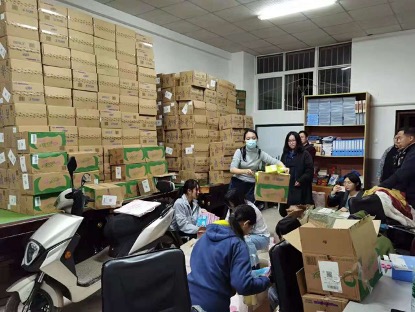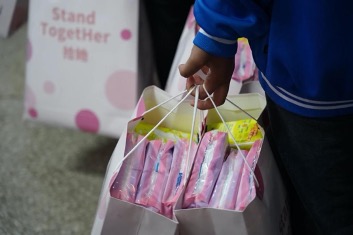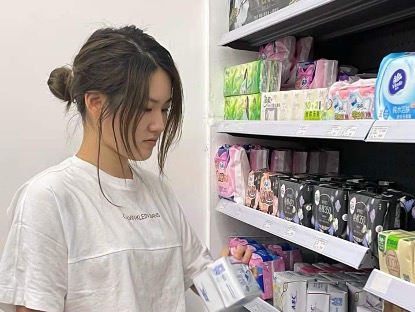A high school student devotes herself to helping girls suffering from period poverty in China.
By Ella Lang in Chongqing
When most high school students are busy preparing for university entrance examinations in China, Peng Wanqian struggles to strike a balance between her study and her NGO work.
Peng, a 19-year-old high school student in Chengdu, founded a student organisation Stand TogetHer in February 2020, to help girls suffering from period poverty in China.
The organisation launched a programme to donate menstrual pads to teenage girls in Zhaojue County in Sichuan Province in August 2020.
By collaborating with Shanghai Rende Foundation, an established charity foundation founded in 2011, Stand TogetHer raised around RMB ¥124,000 (US $17,500) from more than 2,800 donors online in 28 hours during August 2020.
“Raising so much money in such a short period of time was far beyond my expectation. We only had 500 followers on our public WeChat account, and we were just a small team of eight members at that time,” Peng says.
“I try my best to balance my NGO work and study. But one cannot put too much on one plate. Sometimes I have to make a sacrifice,” Peng says.
On October 11, 2020, Peng and her teammates distributed menstrual pads, bought with the money raised, to about 700 schoolgirls in Zhaojue. The activity clashed with Peng’s TOEFL examination.
“I nearly broke down at that time. In the end, I skipped my exam and went to Zhaojue. My mom accompanied and comforted me the whole way,” Peng says.
“I never regret the decision I made. It is impossible to strike a balance between my studies and my charity work. All I can do is force myself to learn more efficiently,” she adds.
Motivation
What motivated Peng to commit to charity work and even sacrifice her own studies was her first encounter with the concept of period poverty five years ago when she was only 14.
She came across a YouTube video explaining how homeless females in America deal with menstruation.
But Peng did not link it to the situation in China at once. She began paying attention to women’s menstrual issues two years ago, during her first year of high school.
“One day I borrowed a pad from a classmate. She tucked it in her sleeve and passed it to me secretly,” she recalls.
“Then I thought to myself, why do we act like this? Then I realized this is a sign of period shame,” she adds.
Peng says she used to be one of the girls who used black plastic bags to carry pads after buying them and avoided saying ‘menstrual pads’ in public.
The embryo of Stand TogetHer was a research team studying toxic masculinity in December 2019.
Five high school girls in the team, including Peng, created a public WeChat account called ‘Stand TogetHer’ to post their thoughts about gender issues in February 2020. Then they turned it into an organisation.
The NGO’s first project was about donating menstrual pads to female medical workers fighting on the frontlines of the COVID-19 pandemic in Wuhan in March 2020.
“The scale of donation was small. We raised about RMB ¥10,000 (US $1,500) in three days. Nobody in our team had any experience in doing this, and we encountered many difficulties in operation,” Peng says.
“We did not know how to raise funds online. And it was hard for us to reach out to period product companies for sponsorships since we were just high school students,” she adds.
“Some members wanted to quit due to pressure, but everyone worked really hard. We sent messages to customer service teams of period product companies on Taobao and used all available channels to raise funds. Finally, we were able to donate 240 boxes of pads to the frontline workers,” she adds.
First Step
Peng then set her sights on Zhaojue County in Sichuan Province, one of the poorest areas in China.
In June 2020, Peng, together with four other students from Stand TogetHer, visited Zhaojue to learn about the period poverty problem schoolgirls faced there.

“A teacher told us the children’s weekly pocket money was between RMB ¥2 (US $0.3) and RMB ¥10 (US $1.5). But the average price of a pad is about RMB ¥1 per pad. Very few girls could afford it, so many girls use tissues as a cheaper alternative,” Peng says.
Back to Chengdu, Peng did research to learn about period poverty online. She searched ‘period poverty’ on Baidu, the biggest search engine in China.
“The search results were all about period poverty in India, Scotland, and America. I did not find anything about period poverty in China,” Peng says.
Peng decided to raise money to help girls facing period poverty in Zhaojue and arouse public awareness about the issue.
“We planned to raise RMB ¥90,000 (US $14,000) in half a year, but surprisingly, we got around RMB ¥124,000 (US $17,500) in two days,” Peng says.
Her NGO used the money to offer free menstrual pads, enough for a whole year, to 700 teenage girls in a local primary school in Zhaojue.

“For the first time, I know that my ideas can be turned into reality with the help of strangers. It really touches me that many people are willing to donate money to an unknown organisation run by high school students,” Peng says.
“For the first time, I know that my ideas can be turned into reality with the help of strangers. It really touches me that many people are willing to donate money to an unknown organisation run by high school students.”
Future
Peng will go to America to start her university life in September this year, but she says she will continue to lead the project.
“I will still go to Zhaojue every year and monitor the progress of our project there. And Stand TogetHer will expand the scale of donation to help more teenage girls suffering from period poverty in Sichuan Province,” Peng says.
The organisation will also organise training sessions about menstrual hygiene for schoolgirls in Zhaojue.
“We are collaborating with medical students at Sichuan University. They are professionally trained and some of them come from Liangshan Yi autonomous prefecture, where Zhaojue County belongs,” she says.
“The identity of high school students is a double-edged sword. We may be questioned for lacking experience and sometimes being irresponsible. But at the same time, we can make use of our student identity to capture media attention, which will help arouse public awareness about period poverty,” Peng says.
Edited by Charleen Chen
Sub-edited by Agnes Lam







































